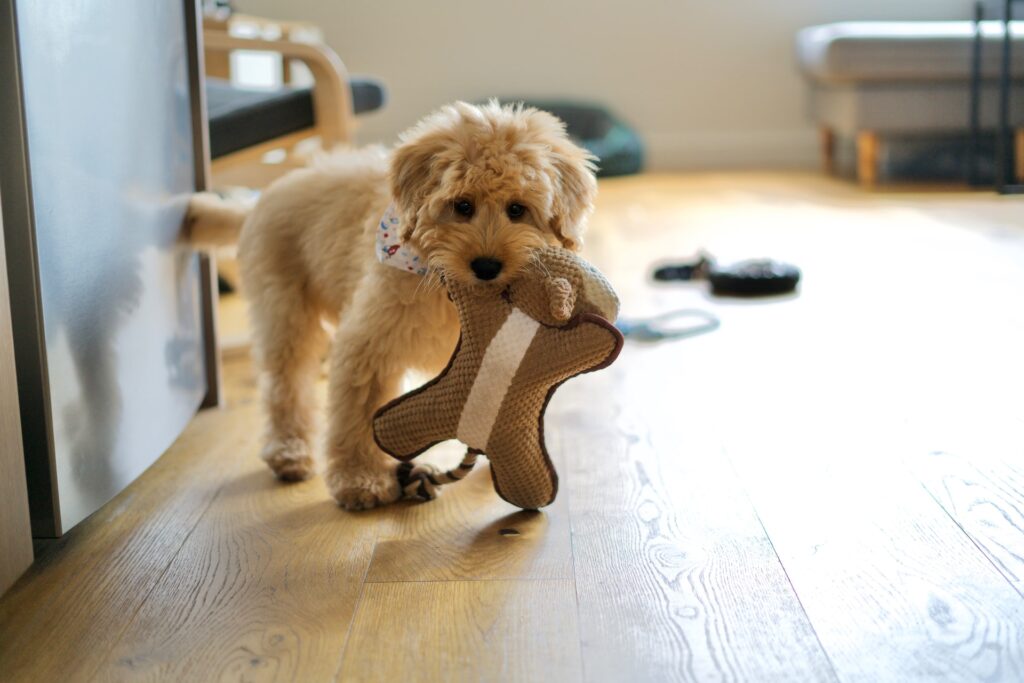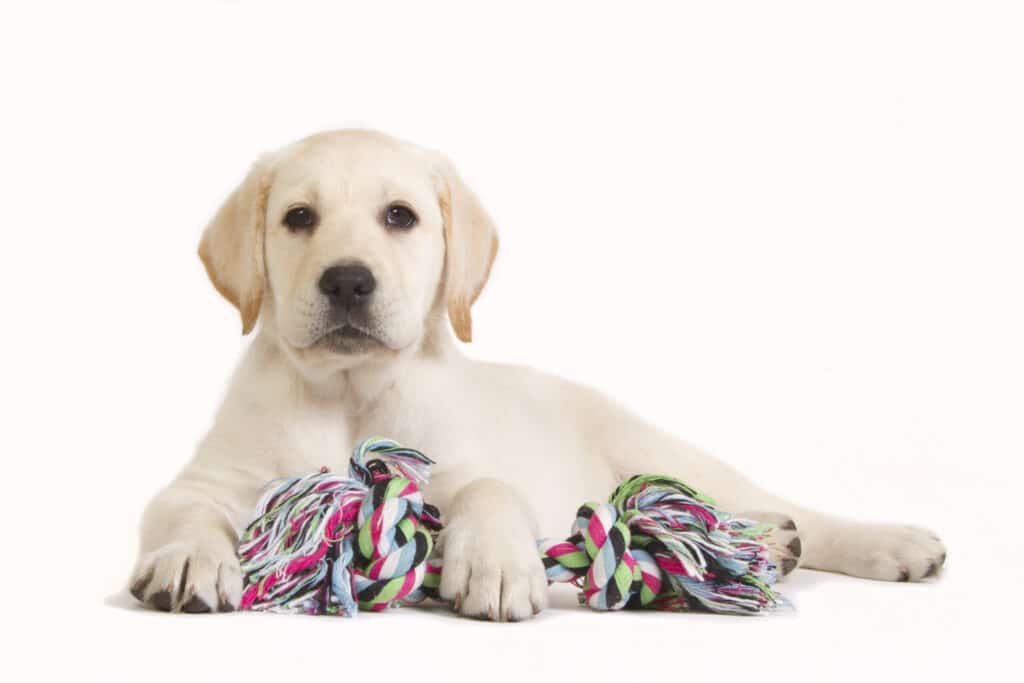How to make a puppy stop biting – 13 tips
If you are looking for solutions on how to make a puppy stop biting, you are not alone. While biting is unacceptable, it is entirely normal behavior for puppies.
Puppies have a lot of reasons to bite, from exploratory biting to learn about the world to socially motivated biting to get attention.
Though biting is usually innocent while dogs are puppies, it can quickly become dangerous and purposeful if not corrected young.
Try these tips on how to make a puppy stop biting and you will surely start seeing results.
1. Offer bones and chew toys

Bones and chew toys will help keep your puppy entertained and provide some solace with its teething pain.
Since puppies are new to this world, they are exploring everything through their mouth. While this isn’t something to discourage, you have to redirect your puppy’s exploratory spirit towards other things. Consider having a few chew toys that you can switch out to keep your puppy’s mind enticed and entertained.
Similar to babies, baby dogs go through a pretty painful teething period. Most puppies distract themselves from the growths in their mouths by chewing on everything in sight.
If your puppy is not letting you pet them without biting, try, and offer a soothing teething toy. This will start to teach your puppy to redirect its energy towards something other than your hand when you give them attention.
2. Tire them out with playtime
A huge reason why puppies bite is because they haven’t had enough mental or physical stimulation in the day. Though dogs love to go on walks, this often isn’t enough to get all its energy out.
For many smaller breeds, a walk will tire their legs out, but they will have so much more pent up energy that isn’t being used. To prevent biting due to restlessness, add some more playtime into your puppy’s day and introduce games such as fetch, tug of war, etc.
3. Offer opportunities to socialize
While it is essential to get in a lot of playing with your puppy, you will not be able to cure its restlessness as well as other dogs. Most dogs play by gently nipping each other. Your puppy may be lacking in dog interaction and trying to get it out by playing rough with you.
An effective approach to cure this problem is to go on walks with friends who also have pet dogs. If you aren’t friends with any other dog owners, no worries, your town likely has a dog park where your puppy can get in some much-needed dog on dog playtime.
4. Use an interrupter cue

An interrupter cue is a strategy to stop biting that is taught to puppies by playing with other puppies. What you want to do is interrupt your puppies biting with an “ouch”, “ow”, “eek” or “yip” noise. These noises simulate the sounds dogs use to show each other that their bites are painful.
You do not want to imitate the sound a dog makes when it is in pain, a simple “ow” will suffice. All you are trying to do is startle your puppy with the interrupter cue, which will interrupt its bite. Try and say the cue in a high pitched voice as soon as your puppy bites you; it can also help to let your body go limp at the same time.
While puppies often bite other puppies during play, they use “yip” sounds to indicate when a bite has hurt. As we are trying to teach our puppies that humans can’t tolerate biting at all, try and use the interrupter cue every time your puppy bites.
5. If your puppy bites, pause playtime
Puppies learn pretty quickly when faced with negative punishment. This doesn’t mean scolding or getting mad at your puppy; instead, it just refers to taking away what they are enjoying. If your puppy is nipping while playing, take away what they want at that moment, which is playtime and attention.
If you sense that your puppy is about to bite, stop playing long enough so they realize you have stopped. This will help teach your puppy that biting means the fun stops. As long as you are consistent, your puppy will begin to associate biting with the negative punishment of its playtime taken away.
6. If they keep biting, ignore them
If pausing playtime isn’t enough to show your puppy that biting isn’t okay, you can take tip three a step further. Though puppies love playtime, they crave, above all else, your attention. So to teach them biting isn’t okay when your puppy nips, completely ignore them.
This can be done by walking away or even just by turning the other way. To make this effective, only ignore them for 10-20 seconds. This will be long enough for them to miss the attention but not too long that they will get distracted with something else.
7. Teach the words “yes” and “no”

If you were only going to train your puppy to respond to two cues, it would probably be best for those words to be “yes” and “no”. When your puppy has done anything right, give them a treat, and use the word “yes” in a cheerful and loving voice.
Every single time your puppy bites or does something else undesirable, use the word “no”. Dogs are incredibly perceptive to a mood change, so a little goes a long way when you are upset.
Try not to say it in a mad or aggressive way as that may scare your puppy, making the word ineffective. Instead, try to act visually and audibly disappointed. With time your puppy will be able to understand that when you use the word “no”, they have done something you do not like.
8. Teach your puppy to “leave it”
Another training command that will go a long way when looking at how to make a puppy stop biting is “leave it”. This is a pretty useful technique, but it is far more difficult to teach than “yes” or “no” as it is all about restraint, which is certainly not a puppy’s strong suit.
While you generally teach the “leave it” command to prevent your puppy from grabbing objects off the floor, it is pretty easy to translate to biting.
To teach “leave it” you want to drop a treat on the ground so your puppy will notice it, use the command “leave it” or “no”, and then cover it with your foot so they cannot get at it.
If the puppy attempts to get the treat by licking or biting your foot, reaffirm that they shouldn’t by firmly saying the words “leave it”. Eventually, when your puppy gives up or at least stops trying to get under your foot, reward them with praise and a different treat.
Once they start to get the hang of it, you can practice this command with other objects such as toys or shoes. This will teach your puppy that “leave it” means that they should not pick the thing in question up with its mouth.
Eventually, once your puppy understands that “leave it” means not to use its mouth, the command can be transitioned to prevent biting.
9. Keep hands and feet away during playtime
While it is fun to use your hands to pet, tickle, and poke your puppy during playtime, it may be encouraging them to bite. You and your puppy may look at these interactions as loving and affectionate. However, you should probably save these games for after your dog has passed the biting phase.
When you use your fingers or feet while playing, you are training them to see your limbs as a toy. It’s natural for dogs to chew on their toys, so you want to prevent your puppy from seeing your hands as toys early on.
Since a dog biting its toys isn’t bad at all, it can be pretty hard to train them to stop biting your hands once they’ve made the association. Try and keep a toy in your hand while you play and resist the temptation to use your own body while playing.
10. Redirect your puppy’s attention
To take tip number 8 a bit further, you may want to try redirecting your puppy’s attention onto toys or treats when they bite. For example, if your puppy bites every time you pet them, it can help to get its focus off of your hands.
Sit down with your puppy and offer a chew toy or little treats so that you can easily pet him. This is not rewarding bad behavior; you are just preventing your puppy from biting in the first place. In due course, your puppy will get used to being touched, and eventually should stop biting even without using the distractions.
Try and avoid using any toys or treats that make your puppy territorial and less open to being petted. Some dogs snap or bite while they are chewing on a bone or their favorite toy. While this is definitely something that will need to be trained, later on, using one of these objects will only put you at a disadvantage.
11. Keep a toy handy

If your puppy can’t help but chase after and bite your feet when you walk around, consider carrying around a toy. This works the same as tip number 8 as you are trying to redirect your puppy’s attention until they eventually get used to your feet going by.
When you are walking, and your puppy tries to go for your feet, you want to stay still and redirect its attention to a toy. Once your puppy’s attention is redirected, you can reward them with the toy and keep walking.
Continue to follow these steps every time you see your puppy lunging towards your feet. Carrying around a toy is something that everyone in your house, even your kids, can do to help train your puppy to stop biting.
12. Try not to pull away quickly
While it may be a natural reaction to jerk your hand, finger or foot away when your puppy bites, this is often the wrong approach. When you quickly pull away from your puppy, it generally entices them to bite more since it may seem as through you are playing a game of sorts.
Try and let your body go limp, instead of pulling away. This will make your body part feel less like a toy that your puppy is playing with, which will make it less appealing to them.
13. Give your puppy some space
If you have tried some of the other techniques on this list of how to make a puppy stop biting and your puppy keeps biting you, putting them in a form of “time out” may do the trick. Stay calm when you do this, as this isn’t meant to punish your puppy.
Frequently puppies bite because they are overtired or too energetic, so separating them from you will give them room to calm down or get some much-needed rest. Depending on the situation, you may want to let your puppy outside, put them in their crate, or on their bed.
Conclusion
Though it may be annoying, disrespectful, and even painful, biting is pretty normal for any puppy. However, through consistent effort, you can break that behavior young since playful biting can become far more dangerous when your puppy grows up.
As biting is normal for puppies, it can be quite challenging to teach them that it is wrong, but do not give up. If you start young and use the right approaches, any puppy can eventually learn to stop biting, so be patient.






